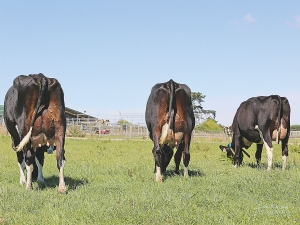Selecting for disease- resistant cows has become a reality for farmers around the globe as genetic developments continue to advance.
Somatic Cell Score (SCS) has been used for over three decades to monitor, measure and breed cows with lower somatic cell scores. SCS offers an objective measure available through national milk recording systems, with the historic objective primarily being to prevent mastitis. Despite somatic scores dramatically reducing on-farm since its introduction, somatic scores reducing hasn’t significantly resulted in a reduction in the clinical cases of mastitis.
Ask any dairy farmer, anywhere, mastitis is the leading cause of udder breakdown, and cow attrition outside of fertility – that without mentioning the cost of treatment, time out of the vat and general use of penicillin.
In April 2018, the US Council on Dairy Cattle Breeding (CDCB) released genetic evaluations for resistance to six diseases, including mastitis, providing a more direct method of selection for improved udder health than using SCS alone.
The CDCB evaluation, combined with Zoetis’ independent mastitis evaluation, now creates a powerful pathway for dairy farmers wanting to breed mastitis resistant cows and reduce the actual clinical cases of the disease the see on-farm.
The development and genetic improvement of any trait relies on the collection of measurable phenotypes.
For most traits, the pipeline of data has existed for decades through milk recording, and data points such as milk production, somatic cell counts, breeding dates and calving dates to name a few.
Within the US the foundation of mastitis resistance evaluations relies on event data voluntarily recorded and reported by producers from on-farm management software.
This information is then standardised at Dairy Records Processing Centres (DRPCs), to create a centralised system of capturing health data at a national level.
Among the health traits evaluated by CDCB, mastitis has the highest incidence rate on farms, and the mastitis-resistance predicted transmitting ability (PTA) has the highest heritability. This means relative to the other diseases, mastitis resistance is well-suited to improvement through genetic selection.
First introduced for Holsteins, the mastitis resistance trait is expressed as percentage points of resistance to mastitis above or below the breed average. If comparing the PTAs of two sires, the difference between their PTAs shows the difference in mastitis incidence in their daughters. Because the trait is expressed as resistance, larger values are more desirable, and selection of parents with higher PTAs should result in offspring that are more resistant and therefore less likely to be affected by mastitis events. In the December 2022 official CDCB evaluations, mastitis resistance evaluations were available for Holsteins, Jerseys and Brown Swiss.
Within the US strategic breeding practices, such as the utilisation of sexed semen and use of beef sires on dairy cows, have expanded over recent years and resulted in more consideration around how many replacement heifers are needed for a herd and which females they should be created from. Coupled with shrinking national heifer inventories, most herds will react with reduced turnover rates, which means milking older cows.
This offers advantages but comes with challenges as well. A cow may not reach her peak potential for milk production until her fourth lactation, so by shifting to an older herd, producers can maximise the milk their farm produces.
As cows get older, they also become more susceptible to culling factors, like disease or death.
To combat this, selecting for mastitis resistance and genetically resilient cows that remain healthy, productive members of the herd lactation after lactation is important now more than ever.


















